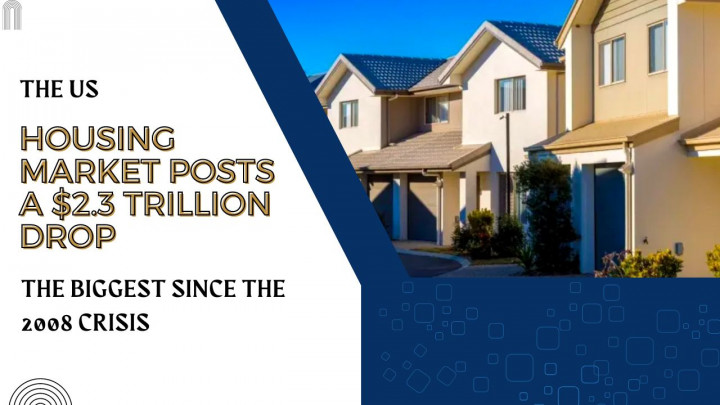The US Housing Market Posts a $2.3 Trillion Drop, The Biggest Since The 2008 Crisis

The US housing market has seen a significant drop in value, with a total loss of $2.3 trillion over the past year. This is the biggest drop the market has seen since the 2008 financial crisis, as the housing bubble burst and led to a global recession.
The COVID-19 pandemic has played an important role in the recent decline, as the pandemic has caused economic instability and widespread job losses, resulting in lower housing demand. In addition, the increasing cost of construction materials and labor has made it more expensive to build new homes, which is having more impact on the market.
Because of this decline, many homeowners are now in mortgage debt, owed more than their homes are worth. This could lead to an increase in foreclosures and a decrease in the overall stability of the housing market. The housing market is an important part of the US economy, and this drop in value could have far-reaching effects across the country. It remains to be seen how the market will recover from this setback and what steps will be taken to address the challenges it presents.
What caused US Housing Market Posts a $2.3 Trillion Drop?
In this explanation, we'll look at the main causes of this decline and the difficulties they present for the housing market and the larger economy.
Unrest In The Economy Brought On By a Pandemic
The COVID-19 pandemic is among the major factors behind the recent decline in the US housing market. Millions of Americans have lost their jobs as a result of the pandemic, and many more have had significant income disruptions. Due to the fact that many people cannot afford to buy or rent homes, the demand for housing has decreased as a result.
The pandemic has also altered how people work and live, which has had an effect on the housing market. For instance, as remote work has become more prevalent, there is a rising demand for larger homes with separate office space. In contrast, demand for some urban areas has decreased as people look for homes with less density and more space.
Rising Building Costs
The rising cost of labor and construction supplies is another factor causing the housing market to be in decline. Supply chains have been hampered by the pandemic, which has caused a shortage of vital building supplies like lumber and an increase in prices. Due to a lack of skilled workers and an increase in demand for construction services, labor costs have also increased. Building new homes becomes more expensive as a result of these rising costs, which may result in fewer new housing starts and further affect the housing market.
Read More: What is Chat GPT & How To Use Chat GPT to Make Money Real World
Mortgages That Are Underwater
Many homeowners are currently underwater on their mortgages, which means they owe more on their homes than they are worth, as a result of the decline in housing values. This might cause financial hardship and possibly increase the number of foreclosures. Housing prices can fall even more as a result of foreclosures, creating a vicious cycle that can be challenging to escape.
Strict Lending Criteria
Mortgage lending criteria were tightened as a result of the 2008 financial crisis, making it more challenging for many Americans to get mortgages. Although these stricter lending requirements were implemented to prevent a recurrence of the housing bubble that caused the financial crisis, they can make it challenging for some prospective homeowners to enter the market. As a result, there may be less of a demand for housing, which could result in a decline in housing prices.
A Lack Of Available Housing
For several years, there haven't been enough homes on the market in the US, which has led to an increase in housing costs. There are fewer homes being built, fewer homes being put on the market, and more Americans choosing to age in place rather than downsize as causes of this shortage. But given the recent decline in housing values, some homeowners might decide to list their properties, which would increase the supply of homes on the market and possibly stabilize prices.
Possible Policy Modifications
The housing market might also be significantly impacted by potential changes to housing policy. For instance, the Biden administration has suggested several measures to increase access to affordable housing, such as extending the Low-Income Housing Tax Credit and increasing funding for the Section 8 housing voucher program. Although some of the issues facing the housing market may be helped by these policies, they may also have unintended consequences that affect housing values.
Read More: What is Google Bard, why it Will Take Over ChatGPT
When Will The Market Recover ?
Given that the housing market is influenced by a variety of variables, many of which are unpredictable, it is challenging to forecast when the US housing market will fully recover from the recent $2.3 trillion decline. The timing and speed of the market's recovery, however, could be influenced by a number of factors. The COVID-19 pandemic's course is one important variable. Due to widespread economic disruptions brought on by the pandemic, there has been a significant impact on the housing market. The recovery of the housing market may be further hampered if the pandemic worsens or if there are additional waves of the virus.
The overall health of the US economy is a further important factor. Because of the close ties between the housing market and the overall economy, a healthy economy can support a healthy housing market. The recovery of the housing market could be supported if the economy keeps making progress after the pandemic-related setbacks.
Moreover, adjustments to federal, state, and local policy may have an effect on the housing market's recovery. For instance, measures to increase the availability of affordable housing or to increase housing demand could aid in the market's recovery. In contrast, laws that limit credit availability or charge homeowners extra fees might impede the market's recovery.
The US housing market has historically recovered from downturns, but the timing of these recoveries has varied greatly. For instance, the housing market's recovery from the financial crisis of 2008 took several years, and it differed greatly across the nation's regions. Depending on a variety of variables like the regional economy, demographics, and housing supply, some markets recovered more quickly than others.
It's important to remember that the recent decline in home prices may present some short-term opportunities for buyers. As an illustration, lower housing costs might make it more feasible for first-time buyers to enter the market. Furthermore, investors may spot chances to buy houses at a discount and possibly turn a profit when prices eventually rise.
Conclusion
The COVID-19 pandemic, rising construction costs, underwater mortgages, stringent lending standards, a lack of available housing, and potential policy changes are some of the causes of the recent decline in the US housing market. Even though it is difficult to predict how these variables will interact in the upcoming months and years, it is obvious that the US housing market will face significant difficulties in the near future. Due to the housing market's importance to the US economy, these issues could have significant effects on the entire US economy.
Increased foreclosures are one potential repercussion of the recent drop in housing values. Homeowners may be at risk of foreclosure if they are unable to make their mortgage payments because they are underwater on their loans or are having trouble making ends meet due to the pandemic. The overall stability of the housing market may also be affected by foreclosures, which can cause a further decline in home values.
Read More: Why Bing's New Chatbot Is Put To The Test 2023
